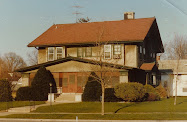An unpublished op/ed from 2006. Times have changed.
We learned to live with autism as a disorder, now we need to learn to live with it as a cause
I went shopping today after I dropped my children off at school. It was a tough morning; they were crabby, bickering all the way. So it was with relief and happiness that I went to do some errands on a gorgeous spring day. Our lives have been busy - we were all home for April vacation– so it was nice to meander through the store alone after a week full of kids, movies and too many French fries. When I got to the check-out counter, the gentleman at the register offered the woman in front of me a chance “to donate to a good cause.” I was ready to give, I thought, there’s always a worthy cause and I always give something: cancer research, Jerry’s kids, food banks, whatever. Except this time I saw the puzzle piece logo and I froze - the cause was mine. Here it was, a nationwide chain raising money for Autism research. I felt validated, elated, and profoundly ambivalent.
We have been shouting in the darkness about the autism epidemic for so many years that, now that the lights are on and someone is listening, I found myself startled and blinking. Suddenly, I felt exposed and vulnerable. It isn’t as though other causes have not touched our lives; we gave for cancer research before and after family members were taken by that disease. But it is hard to overcome that protective instinct that makes you want to shield your family from the scrutiny that comes with autism and its misunderstood history. It was almost easier to be the underdog because then we could keep it on a small scale; we could band together as parents and help our kids within our communities, and life would go on.
Autism affects families in vastly different ways, and so to have our son’s autism, which we have worked for years to make a positive force in our lives, become, by association, a full-fledged fundraising behemoth, perhaps we should expect to feel conflicted. Autism-the-cause does not describe my son or our family; autism-the-cause does not begin to touch the beauty and humor he has brought to our lives; autism-the-cause does not make us better or worse as parents but it does expose our family to a more public kind of attention, and more opportunities for understanding – and misunderstandings, as well.
And there’s a cynical side to it – now that autism has affected so many families of people in high places, autism is the cause du jour, just another ribbon, bracelet, or bumper magnet. No one really wants to be a bumper magnet – soldiers at war, people with cancer and aids, people with autism. Even as it raises awareness, which is a good thing, those magnets seem to me like a flip and cursory nod to issues so serious I would just as soon not see it on the back of a vehicle. But expressing that sort of vitriol about something an innocuous as a magnet is a kind of denial, too, that maybe things are not so dire that we need autism to be a cause.
But we do. Autism is a lifelong disorder for those who are disabled by it; they need assistance in communicating with and interpreting the larger world.
So, in spite of my reticence and thanks to the Herculean efforts of many, many people, autism has emerged as a full-fledged cause, and deservedly so. Money is desperately needed to research the current epidemic and to develop therapies and educational programs for this growing population of people disabled to varying degrees with varying outcomes.
On a morning when autism was, for once, not demanding most of my attention, it popped up and snagged me when all I really want to do is find a new book bag for my daughter. Now, just as I got used to autism grabbing my attention in the form of an 11-year old boy, I will get used to it grabbing my attention at the check-out counter. It is an adjustment I am happy and grateful to make.



No comments:
Post a Comment